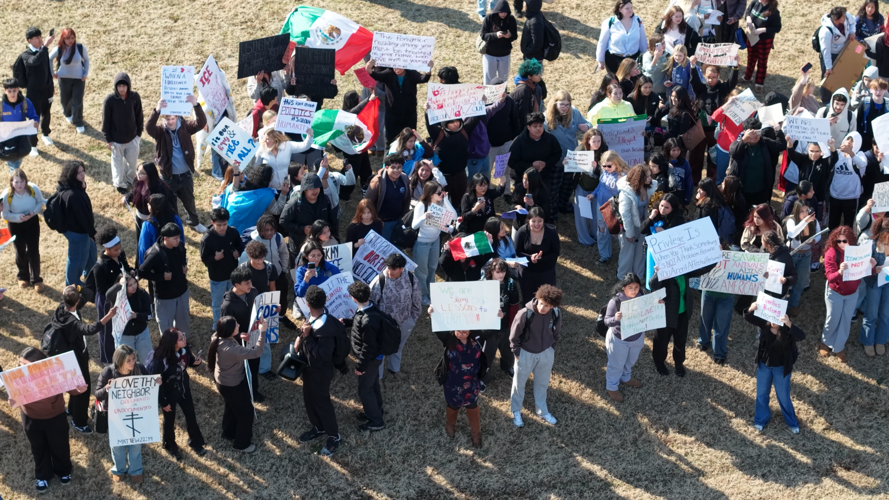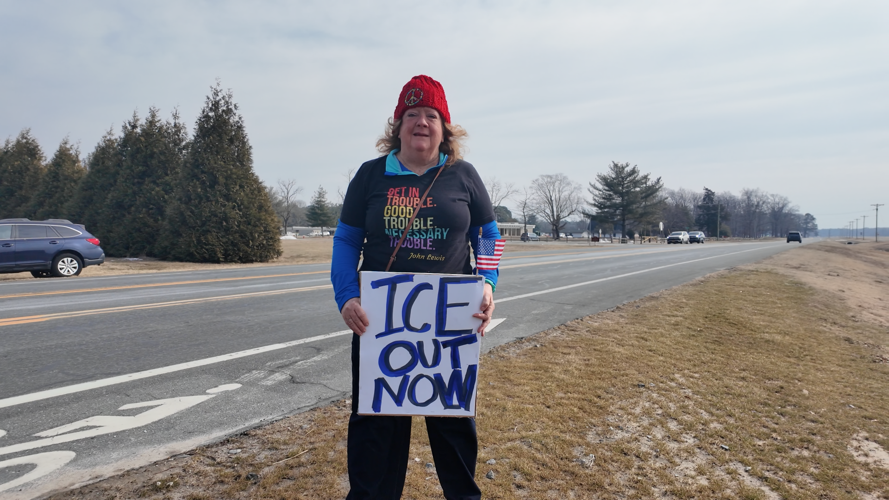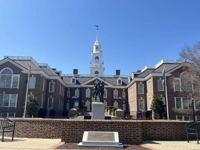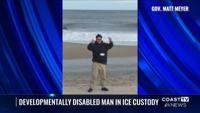GEORGETOWN, Del. - Sussex Central High School students gathered on Wednesday, Feb. 11, in the afternoon in front of the school for a peaceful, student-led walkout over concerns about immigration enforcement and its impact on families in Sussex County.
The Indian River School District confirmed that about 150 students participated.
Student organizer Rafael Farrera Juárez, whose family is from Mexico, said the support from fellow students was meaningful.
Students hold signs during a peaceful walkout at Sussex Central High School in Georgetown on Wednesday.
"Here in Georgetown, it's known for a lot of Latinos, such as myself, to reside here, and us Latinos, who realize that sometimes our parents are out there working and they're out there making money to provide for their families, and even then, they risk the chance of one day going out and not returning," Farrera Juárez, who attends 12th grade, said.
Community members also attended the walkout against U.S. Immigration and Customs Enforcement (ICE), including retired Indian River School District counselor Lisa Hunt.
"It touches my heart, and I know they know their rights, and they know that they had the right to do this, and they also know that we need to speak up for each other," Hunt said.
Giovanni Tiano, who also helped organize the event, said the issue is personal to him because Raúl Tapia, the Georgetown man detained by ICE last week, is the father of his best friend.
"This is something that Rafael and I have been talking about for a while, even before then. The night before Raúl had gotten detained, we were at the gym talking about it because we saw a school in Bel Air hosting a walkout, and we were even talking about the Cape Henlopen walkout that had been going on," Tiano explained. "I was driving home that night, and I was thinking about what it's going to take for us to do something like that, what it's going to take for people to stand up and show out. It's heartbreaking because the next day it happened to us, directly affecting my best friend, with whom I've been a part of their family for years."
Tapia was on his way to work with one of his sons when he was detained just down the street from where he lives.
"It was just crazy, and everything happened so suddenly. So, we just felt the need to do something and to support our students' voices and our community," Tiano added.
Hunt said she also knew the Tapia family, as their children were students at the school she was in.
"I was just heartbroken when I heard what they went through," Hunt recalled. "I just stand in solidarity. I'm so happy that the students have found a voice."
In a statement to CoastTV News, the Indian River School District said in part that "this was not a school-sponsored event but the demonstration was conducted peacefully and numerous measures were taken to assure the safety of the participants. The remainder of the school day and student dismissal were conducted as normal."
In a Facebook post on Tuesday, Sussex Central High School said administrators were aware of plans for the student-led protest.
"While we believe that student voice is important, as a public school, Sussex Central High School remains neutral and nonpartisan and is required to follow district policy while focusing on maintaining a safe, orderly, and uninterrupted learning environment for all students," the post reads.
The school said the walkout was not permitted during the instructional day under district policy. Administrators said students who left class or the building without permission would face disciplinary consequences under the district's Code of Conduct, including being marked as skipping class. Students who left campus would not be allowed to re-enter, and those who signed out early were expected to leave school grounds to avoid being cited for loitering, the school added.
"The turnout was great regardless of whether they were Latino or any other racial identifying subcategory. It was great seeing all those marginalized groups that Sussex Central represents. We are a Title I school, and everybody came out, showed up, and it was great," Farrera Juárez noted. "There are people in support of us who were just watching from the window, and even then, that's great, seeing that support. That's what we really were out there for."
More students hold signs during a peaceful walkout at Sussex Central High School in Georgetown on Wednesday.
Minutes before the walkout began, CoastTV News witnessed a student being taken into an SUV by police. Regarding that incident, Delaware State Police said, "It was reported that a student allegedly threatened to shoot anyone in the school who did not walk-out in protest."
DSP added that the student was detained by the school resource officer assigned to the school.
"He was removed from the school and ultimately released back to the custody of the school," DSP stated.
According to DSP, detectives continue to investigate the incident.




























































































